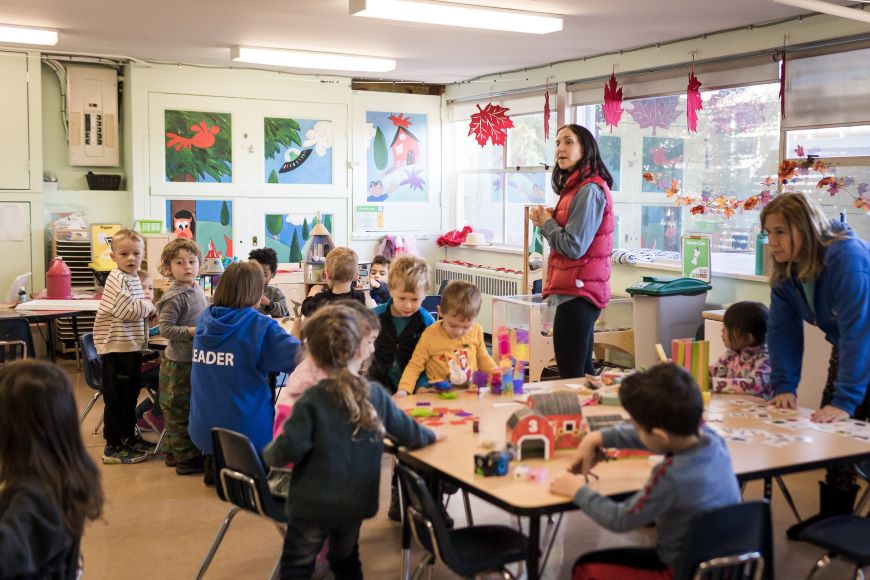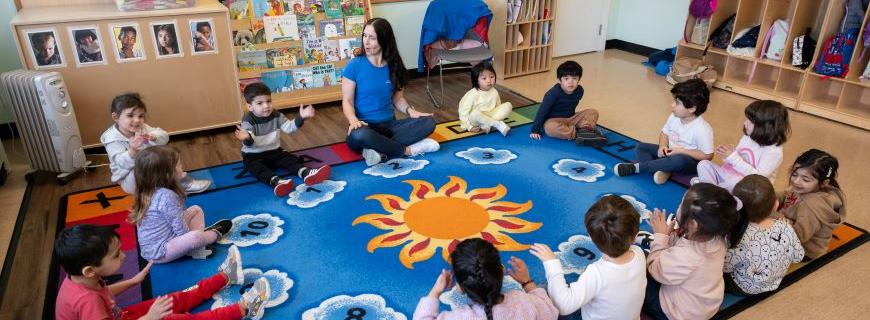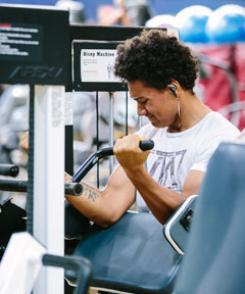Choosing a preschool for your child is a big decision! You want a program that will prepare your child for kindergarten, while supporting their holistic growth—emotional, social, creative, physical and intellectual.
At NVRC, we see children as strong, capable and full of potential. We operate three licensed preschools—Lonsdale, Sandpiper and Delbrook—that focus on creating a positive learning environment and building self-confidence and life skills.
To give you a better idea of what NVRC preschools offer, and help you decide whether our programs are right for your family, we sat down with Helen, one of our dedicated Early Childhood Educators at the Lonsdale Preschool, to learn more about the preschool program and what parents and children can expect.
What are some of the most important skills you focus on in preschool to prepare children for kindergarten?
Helen: Most parents believe that kids need to be reading and writing before they go to kindergarten, but they don’t. We focus on helping them learn how to act in a classroom setting. It’s about learning to listen, to be patient, to wait their turn, to answer questions, to put their hand up… really learning how to be with a teacher, as well as other children in a group setting.
And we really work on growing the child’s sense of independence. Having them be able to say bye to mum or dad at the classroom door, when they might have been clinging to them at first. Learning that it’s okay to be at school, that they’re safe, they’re going to have fun, and mom or dad will be back to pick them up at the end.
How do you work on building your students’ independence?
Helen: We teach them how to act with their friends, how to share. And we encourage them to get up and talk in front of everybody at circle time, to show something to the group and answer questions.
We've had children come to preschool for months and not want to say anything at circle. And then, all of a sudden, they've watched everybody else do it, and they've got up the courage and they've done it! And we celebrate their bravery. We say to the class, “Come on now, let’s give so-and-so a clap!” and each time, you can see that their confidence grows and grows.
We also encourage the children to help out. We give them little jobs to do and praise them for things they've done. Especially the ones who are a little bit quieter and not very confident. We teachers work with those kids a little bit extra, because some kids just need that little extra push. It really, really matters. It goes a long way to help them just feel more confident about talking, about being themselves and not keeping their head down, not hiding. And then, there’s no stopping them!
Why should parents consider sending their children to preschool?
Helen: I can share one example that really illustrates the why. We had one little boy who started in September, and he literally held on to his mum so tight at drop off that she couldn't peel his hands off her. But you know what? It only took a few weeks, and now he comes in smiling, he says, “Bye mum!”—well actually, he doesn’t even say bye to mum, we have to remind him to say bye to mum! He just comes in and he's happy.
He was very quiet at the start, but now he's talking more, and he’s got more expression in his face in class. It was hard for the first few weeks, but now he’s doing great! Can you imagine his mom having to go through that in kindergarten? When he starts at the big school and there are a lot more kids? With preschool, we get the hard work done now, so when they get to kindergarten, they'll be like, “Bye mum!”. We've got so many examples of these kinds of transformations in our students!
What about reading and writing?
Helen: When they go to kindergarten, they don't actually need to know how to read or how to write. We do teach them their letters, and how to write and hold a pen correctly and use scissors and all those things, but our main focus is on getting them to the point where they are able to take part in the class and be aware of what’s happening around them. They learn to understand: “Okay, the teacher’s talking, so I shouldn’t be poking the person next to me or talking. I should be listening now and maybe getting ready to answer a question.” And that’s so important for their successful transition into the school environment.
What advice would you give parents sending their children to preschool for the first time?
Helen: A lot of the time, we find when parents bring their child to preschool for the first time, they are very hesitant to leave their child, especially if the child is having a little bit of separation anxiety. It can be hard on parents and kids, but we teachers are very used to this situation, and we’ve seen it many times. Parents can trust that we will work hard to make their child comfortable and happy in our preschool and help them to develop their independence and move through the separation anxiety. It may take some time, but we will get there in the end!
How can parents help to prepare their children for preschool?
Helen: Before they start preschool, it’s really helpful to take them to other early years programs to help them get used to being away from mum and dad for a little while and being in a group with other children. At NVRC, we have lots of early years dance, music and sports programs for children and their parents, including Toddler & Me.
The preschools also offer a summer camp program, called Little Campers, which is great way to get kids comfortable with the preschool teachers and some of the routines, especially because the camps happen in our preschool classrooms. Even if you just put your child in for the last couple of weeks of summer, it can make for an easier transition in September!
How do you communicate with the parents to keep them updated on their child’s progress?
Helen: We welcome parents to come chat to us, and we’re also in touch by email—our parents know that if they've ever got any questions or concerns, they’ve only got to check in before or after class or by email. And we send photos of the kids during the week, so parents can keep up with what their kids are up to in our classroom.
What does a typical day in an NVRC preschool look like?
Helen: Our schedule is designed to get the children used to the routine of a school setting and learn how to manage transitions from one activity to another throughout the day.
When they first arrive at the classroom, they put their bags and jackets in their cubbies, and they wash their hands. Then they have some free play time, while we wait for all the children to arrive.
We usually start by going to the gym to play games or to ride on the cars and bikes and scooters we have there. Then, we come back to the class and have circle time, where we sing songs, do some learning activities and practice our listening skills.
After that, the students get to be independent during free play, where they can explore whatever activities are on offer that day. We will have toys out, and teacher-led art activities, and water and sand tables, etc. Every day we change it up!
When it’s time to clean up, everyone is expected to help, and then, we wash our hands and have snack time.
After we have a snack, we’ll go outside—as long as it’s not raining or freezing cold! If the weather’s very poor, we’ll stay inside and do a longer circle time with a story.
That’s a typical day! We’re flexible though—we go with the flow. For example, if the weather’s beautiful, we may go outside for a larger portion of the day.

Why is early childhood education so crucial for long-term development?
Helen: It's so important for the children to have that social interaction—just being around other kids. Being able to develop a friendship with somebody is huge for their self-confidence. Also, getting used to interacting appropriately with other authoritative figures, like teachers, rather than just parents or other family members.
We also get a lot of children where English is their second language, and they learn their English so fast in the preschool. And that gives them more confidence to speak to and interact with other children!
What brought you to this work?
Helen: Teaching is my passion! I’ve been at the Lonsdale Preschool for 22 years now—ever since I received my Early Childhood Education certification from Capilano College.
I love supporting the families and the children. I love seeing the children change and grow and mature. Say they start in September, watching their development throughout the year—how their confidence grows, how they've changed, how they've matured in all areas, how they make friends—is incredibly rewarding.
We've had some children who don’t say a word for the first six months. But we keep trying and we keep pairing them up with somebody to try and make a friend, and then one day it’s like, “Oh, my gosh, look!” and there they are, chatting away and playing with others!
And most of these kids, we have them in the preschool for two years, so by the end of the two years, you’re thinking, “Wow, do you remember when?!”. It’s amazing.
What do parents have to say about NVRC preschools?
We also reached out to some parents learn more about their family’s experience with NVRC’s preschools.
From Hilary, parent of a Lonsdale preschool student:
"My son was very shy because he was a pandemic baby and hadn't been in daycare, but he's really found his voice in preschool! He talks about his friends, talks about the activities. He's in his second year now, and he just looks forward to going every day!
The care, attention and thoughtfulness that the instructors give to students who are experiencing a preschool program for the first time is really lovely, and the structure of the program has been wonderful to help my son to know what to expect. We love Helen and Miss Shiraz! They are so responsive, and they share photos of what he is up to in class each week.
I really do appreciate the cultural awareness they build into the lessons as well. For example, the kids learn about different celebrations like Lunar New Year (they even brought in a snake to celebrate the Year of the Snake!) and sing a welcome song to say hello in different languages. It’s such a safe and welcoming environment for the kids to learn in—they can be who they are and play how they want to play. And the art my son comes home with is incredible. I don't know how they do those projects with 20 kids! They're so creative and cool."
From Janice & Mark, parents of two former Delbrook preschool students:
"Preschool really prepared our kids to become more independent and be comfortable being away from us for a little while. They were so excited to go to school that we didn’t have any issues with drop off!
And the social aspect was so valuable. The kids learned how to get along with others, how to share and respect personal space. They’ve also created friendships that have continued into elementary school, which made the transition easier.
We also found the introduction to art, reading, etc. they got in preschool really laid a foundation for what they’re now continuing to learn in elementary school, and instilled in them an excitement and curiosity about learning!"
Registration for our preschools is open now, and there are spots left in our 2025-2026 program!
Visit nvrc.ca/preschool or call 604-987-7529 for more information.




